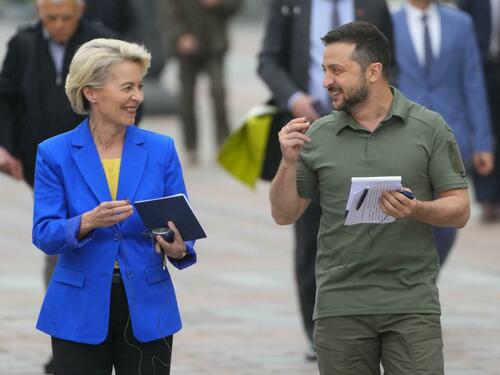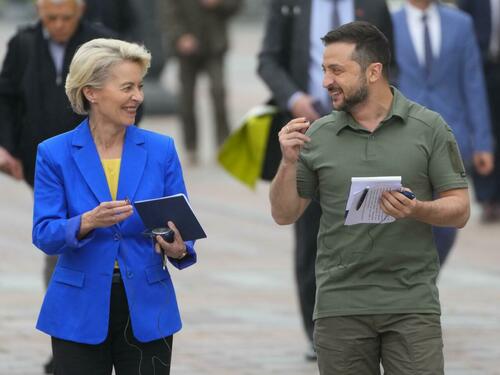The EU Can Back Ukraine If It Wants To: It Just Has To Overhaul Its Political Economy, Military And Markets
By Michael Every of Rabobank
The US-Russia Ukraine War ceasefire talks in the Saudi capital yesterday are causing a chain Riyadh-tion.
Russia made no concessions at all. Indeed, NBC news cites Western intelligence and congressional sources stating that President Vladimir Putin is not interested in a peace deal and instead seeks to gain full control of Ukraine, because “He thinks he’s winning.”
By contrast, rumors are flying of what the US may have conceded: Ukraine’s NATO membership is off the table; a potential Ukrainian election may be on it; and some fear the reduction of US forces in Europe, crystalising the latter’s sudden existential concern over who now defends it. It remains to be seen what is true.
Yet as pointed out in the Grand Macro Strategy report, realist US statecraft is hardly new. For example, in WW2 President F.D. Roosevelt forced UK PM Churchill to exchange British bases for mothballed WW1-era US destroyers, made the UK pay for US goods until it couldn’t continue, then switched to Lend-Lease with terms preventing Britain from ever re-emerging as an imperial power, reinforced by the US forcing sterling to become convertible again too soon post-WW2, and making it remove its Imperial Preference tariffs.
However, there is now an echo of Nixon going to China for some, and Molotov-Ribbentrop for others. Indeed, Russian Foreign Minister Lavrov underlined “high interest” in lifting US-Russia economic barriers, while Secretary of State Rubio stated peace in Ukraine would “unlock” opportunities for cooperation and “some pretty unique, potentially historic economic partnerships.” Which grand strategy logic argues will not involve Europe, not even via cheaper Russian gas, as the market –understanding only macro strategy– prices for it regardless.
Europe is of course outraged, but both France’s Macron and Germany’s Scholz had meetings with Putin without Ukraine present as late as 2022, and Germany regularly worked round it before that. Moreover, it was Macron who told Politico in late 2023 that Europe must resist pressure to become “America’s followers” and the “great risk” Europe faces is getting “caught up in crises that are not ours.”
Regardless, as the talks ended yesterday, rumours flew that Europe would announce a €700bn aid package for Ukraine, which may occur at another emergency EU+UK summit to be held today. If so, we are talking serious money, but equally serious questions arise:
- How many years is this over? The time value of money is existential when geopolitics is this raw.
- How will the money be used? Ukraine is already producing as much war materiel as it can, and Europe has refused to shift to a war economy since February 2022.
- Is €700bn to flow to the EU to create a defence industrial base? If so, where? It needs economies of scale, but that does not allow the entire EU a windfall. And how will the EU not see higher inflation given physical constraints on its capital stock and human capital?
- Is €700bn to buy US arms and support the US defence industrial complex? The same bottleneck and inflation issues arise there, as well as EU-US trade/capital out/inflows.
These are huge issues of economic statecraft and Grand Macro Strategy for Europe (and the US). However, clearly the EU can back Ukraine fully if it chooses to: it will just have to reorder its political-economy, military, and financial markets to do so.
Indeed, the Financial Times op-ed page today is literally begging Europe to do exactly that. Yet that’s as Mario Draghi was recently berating:
“You say no to public debt. You say no to the single market. You say no to creating a capital markets union. You can’t say no to everything. Otherwise, you have also told me to be consistent, that you are not able to deliver on the fundamental values for which this European Union’s been created. So, when you ask me what is better, what is best to do now, I say I have no idea. But do something.”
Mario Draghi barrels into European politicians and leaders for their inaction:
“You say no to public debt. You say no to the single market. You say no to create a capital market union. You can’t say no to everything…You ask me what’s best to do…I don’t know, but do something” pic.twitter.com/CcbVeen7ZD
— Julien Hoez (@JulienHoez) February 18, 2025
Others may: Turkey, NATO’s second-largest military force even if not invited to Monday’s EU summit, has announced it also supports Ukraine’s territorial integrity. Will it act on that with Europe? If so, how? And what’s the quid pro quo, if any?
Muddying the waters further, President Trump has reiterated he will impose 25% (or higher) tariffs on autos and chips from as soon as 2 April – the former hitting Germany in particular. The market is again taking the view that a week is a long time in politics, and April is a lifetime away. It is – things could be far worse by then.
Meanwhile, a US federal judge has given DOGE the greenlight to continue digging into the government’s systems and books – though how much money is actually being saved remains to be seen: one figure is just $50bn, which is a rounding error in the larger scheme of things.
Japan’s 10-year bond yield just hit 1.44%, their highest since 2010. Another rate hike or two and we are back at the pre-GFC levels, and then perhaps even at the first post-bubble phase of around 2%. What kind of chain Riyadh-tion might we see there if this continues?
Regardless, both the RBA and the RBNZ just cut interest rates. The former took its overnight cash rate down 25bps to 4.10% and sounded hawkish while the latter cut by 50bps to 3.75% and signalled more easing to come despite inflation expected to reaccelerate to 2.7% later in 2025. Like the BOE, the Kiwi message seems to be that a weaker economy will shake out high inflation eventually, “because markets.” Unless, of course, it doesn’t, “because emerging markets.”
And geopolitics: don’t think if Europe is being told to spend 5% of GDP on defence that Australia, and even New Zealand, won’t be told to do their bit to contribute towards the US defense of the Indo-Pacific too.
Tyler Durden
Wed, 02/19/2025 – 12:05


